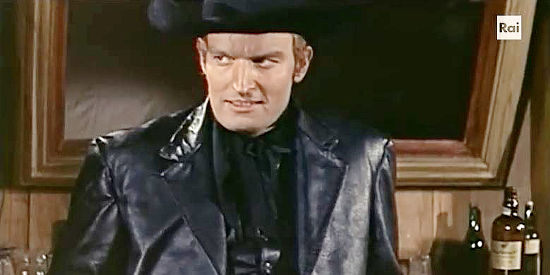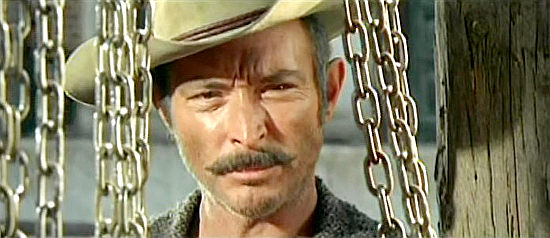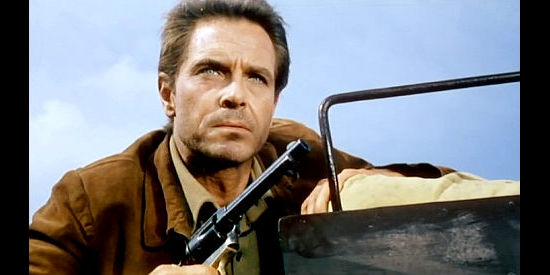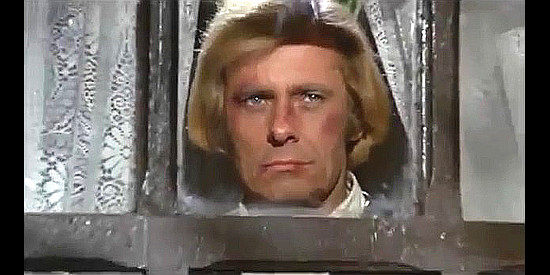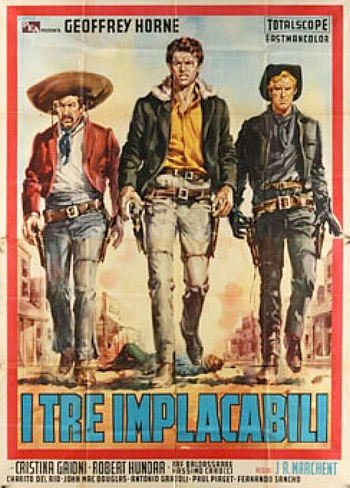 Geoffrey Horne is Don Cesar Guzman, who goes off to sell his cattle one day, kissing his loving wife goodbye.
Geoffrey Horne is Don Cesar Guzman, who goes off to sell his cattle one day, kissing his loving wife goodbye.
When he returns, he finds his home ransacked, his loving wife — who was pregnant with their first child — dead.
He vows vengeance on the seven men who committed the crime. And with the help of a coat pin and a horseshoe left behind as evidence, he tracks down three of the men in short order.
A stranger, Joao Silveira (Paul Piaget), joins him as he spends years tracking down the next two culprits.
To find the final two, he returns home, where the nearby town is ruled by a mayor named Hopkins (Antonio Gradoli) and his hired fast gun, McCoy (Claudio Undari as Robert Hundar).
They’re crooked — they like to eliminate enemies by taking them into a darkened basement for a shootout, smearing the enemy’s guns with a glow-in-the-dark substance so they always win.
But they aren’t the men responsible for his wife’s death. That turns out to be someone who’s far less of a stranger.
Along the way, Guzman and Silveira pick up a third friend, Diego Abriles(Fernando Sancho), rounding out I Tre Implacabili.
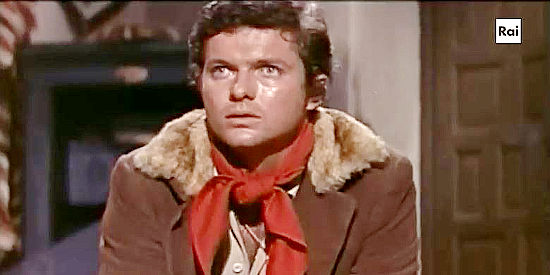
Geoffrey Horne as Don Cesar Guzman, discovering his wife’s lifeless body in The Implacable Three (1963)
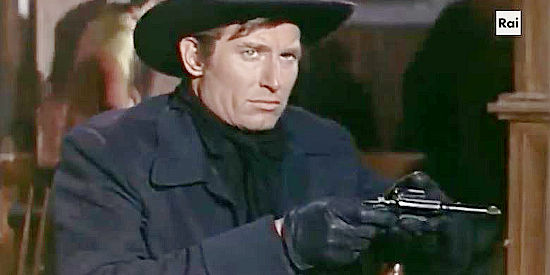
Paul Piaget as Joao Silveira, the man who challenges the mayor to a basement showdown in The Implacable Three (1963)
An early European Western, made before the Spaghetti craze. And, in fact, seeming remarkably old-fashioned in many ways. Just check out that theme song.
But there were hints of what was to come, from the showdowns in the darkened basement to Guzman placing his calling card — a coat pin — on each of the guilty men he kills.
There’s also a scene in which the Fernando Sancho character and the fast gun (McCoy) take turns shooting one another’s hat as a demonstration of their shooting prowess.
Unfortunately, the plot makes so little sense in some spots that you’re left wondering if something wasn’t lost in the dubbing process.
Let’s see, a man goes off in search of his wife’s killers. And two virtual strangers risk their life to help him accomplish his goal? Seems more implausible than implacable.
And the ending degenerates into a muddy mess of a town-wide gun battle where the motives of many participants aren’t very clear.
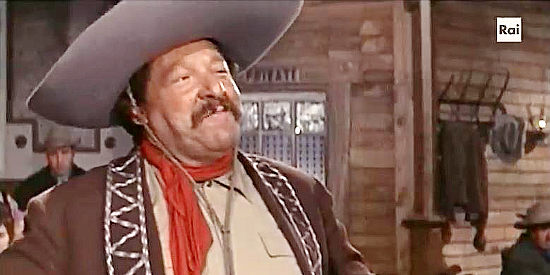
Fernando Sancho as Diego Abriles, always ready to show off his skill with a six-gun in The Implacable Three (1963)
Directed by:
Joaquin Luis Romero Marchent
Cast:
Geoffrey Horne … Don Cesar Guzman
Paul Piaget … Joao Silveira
Fernando Sancho .. Diego Abriles
Claudio Undari … Nino McCoy
as Robert Hundar
Charito del Rio … Ana Luisa Guzman
Cristina Gaioni … Marisol Benavente
Donatella Marrosua … Lola
as Telua Nelson
Fernando Montes … Sheriff
Raf Baldasssarre …. Deputy
Giuseppe Addobbati … Barton
as John MacDouglas
Massimo Carocci … Rex
Santiago Rivero … Don Julio Benavente
Antonio Gradoli … Mayor Samuel Hopkins
Xan das Bolas … Postmaster
Lorenzo Robledo … Ray Logan
Aldo Sambrell … Burglar
Also with: Emilio Rodriguez, Antonio Padilla, Rufino Ingles, Pedor R. Quevedo, Gonzalo Esquiroz, Simon Arriaga, Miguel de la Riva, Jesus Guzman, Enrique Navarro, Juan Antonio Peral
Runtime: 86 min.
aka:
The Magnificent Three
Three Good Men
I Tre Implacabili
Tres hombres buenos
Music: Manuel Parada
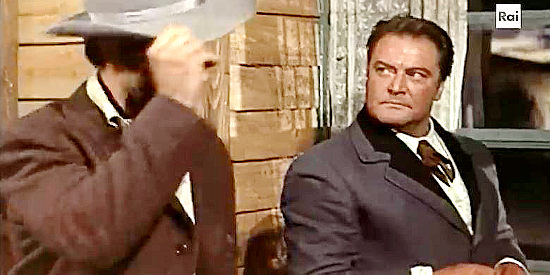
Antonio Gradoli as Mayor Samuel Hopkins, willing to bend the law to retain power in The Implacable Three (1963)
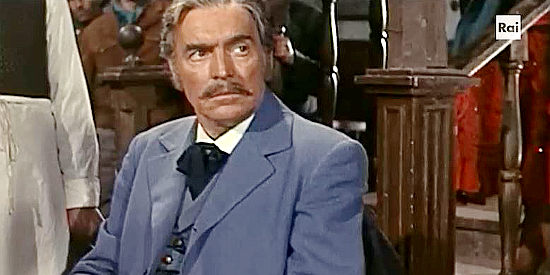
Giuseppe Addobbati (John MacDouglas) as Barton, a rancher who’s turned his fortune around in The Implacable Three (1963)
Memorable lines:
Don Cesar Guzman, about a man riding a horse missing one shoe: “What’s he look like?”
Blacksmith: “He’s just like everybody else. He’s wearing some kind of high-pointed hat. That’s right, with a kind of high top in it. You don’t see that around here.”
Joao Silveira: “Where will you be heading now?”
Don Cesar Guzman: “I don’t know. I don’t know.”
Silveira: “Okay, I’ll stick with you. I was in at the beginning and I want to be in at the end.”
Guzman: “This may ruin your life.”
Silveira: “Oh, without risks, living isn’t worth the trouble.”
Whereupon Guzman starts to ride off alone.
Joao Silveira, to Guzman, whose wife has just been killed: “Nothing’s ever lost.”
Don Cesar Guzman: “You really believe that?”
Silveira: “Years ago, someone was waiting for me. But I went back a little late. Now I have all the time in the world.”
Lola, a saloon girl: “My mother always told me to avoid lonely men.”
Diego Abriles: “Don’t be so hard to get, sweetheart. Believe me, I haven’t got the measles or any other particular sickness.”
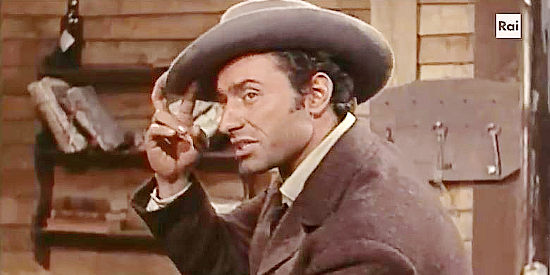
Raf Baldassarre as the deputy, one of the man who does the mayor’s bidding in The Implacable Three (1963)
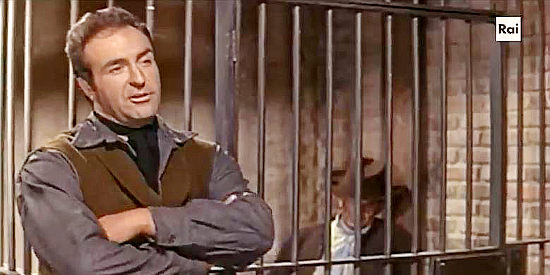
Fernando Montes as the sherriff, upset that warrants have been issued for the avengers in The Implacable Three (1963)
Trivia:
* Geoffrey Horne was born in Argentina, had a key role in “The Bridge on the River Kwai” (1957), but did most of his subsequent acting in TV roles. This marked his lone Euro Western.
* That said, many of the actors in this film became familiar faces during the decade that would follow. The three ladies in the film, not so much. Cristina Gaioni also appeared in “El Cisco” (1966); Charito del Río in 1964’s “Black Angel of the Mississippi.” That about sums up their combined Euro Western experiences.
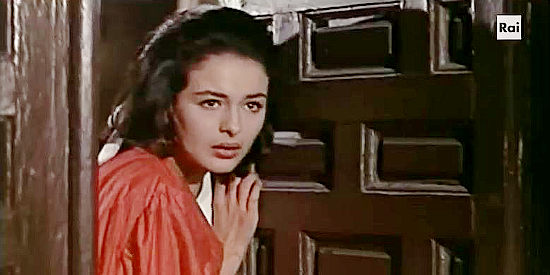
Charito del Rio as Ana Luisa Guzman, about to interrupt the intruders in her home in The Implacable Three (1963)
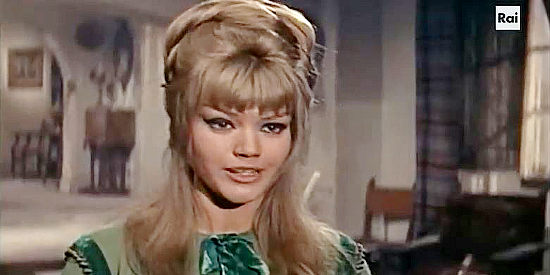
Cristina Gaioni as Marisol Benavente, a longtime friend of Don Cesar Guzman and his family in The Implacable Three (1963)
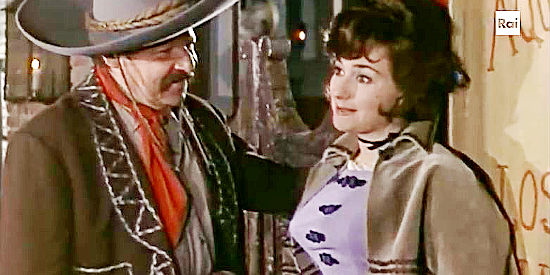
Donatella Marrosua (Tulua Nelson) as Lola, the saloon girl Don Abriles romances, in The Implacable Three (1963)
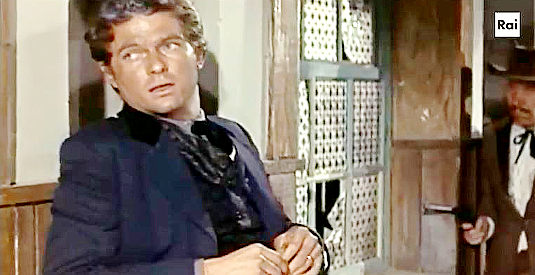
Geoffrey Horne as Don Cesar Guzman, revenge on his mind even as he’s cornered in a saloon in The Implacable Three (1963)

